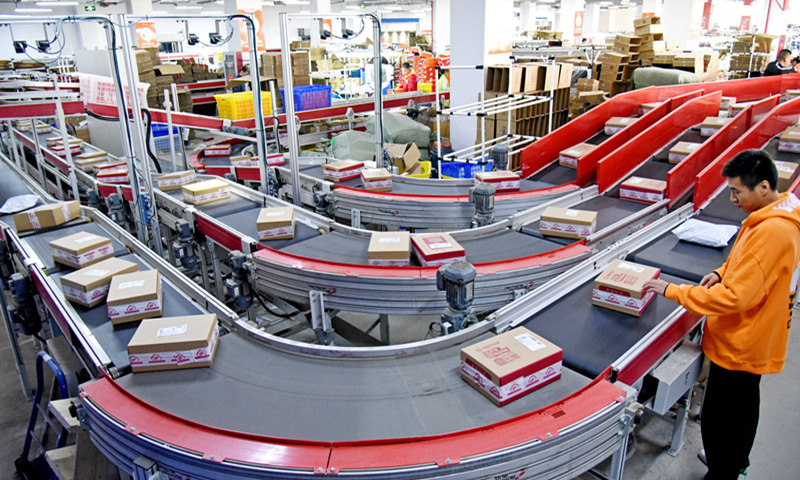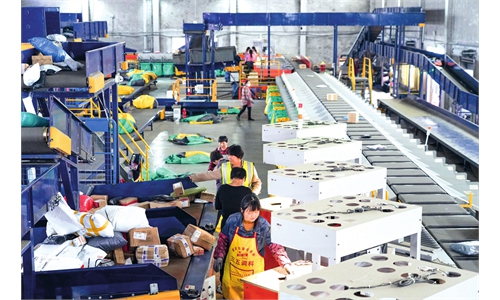Chinese demand for imported goods remains solid during Double 11 despite logistics woes
Consumer enthusiasm unaffected by logistics woes during Double 11

Workers sort parcels of the Double 11 shopping festival in an e-commerce industrial park in Lianyungang, East China's Jiangsu Province on Wednesday. Photo: VCG
Chinese consumers are on a shopping spree for imported products from around the world during this year's Double 11 online shopping festival, defying supply chain disruptions and delivery delays caused by the COVID-19 pandemic.
But logistics hurdles following recent COVID-19 outbreaks in many places across China, which prompted ports and customs authorities to implement stricter anti-epidemic measures and disinfection procedures, could affect overall sales of imported goods during the shopping spree, analysts noted.
"As Chinese people are unable to travel overseas, demand for overseas products - ranging from food and daily necessities to cosmetics and clothes - is robust in the 2021 Double 11 shopping festival. But in recent days, delivery times have been extended, as containers need to go through a complete disinfection process," Huang Gang, manager of e-commerce platform Overseas Tale based in Dalian, Northeast China's Liaoning Province, told the Global Times on Monday.
The company specializes in goods from Japan and the US. According to Huang, the year-to-date sales of overseas products on the platform are basically the same as in 2020, and the platform is ramping up efforts to stabilize overseas supply chains.
A spokesperson from Suning International, which sells overseas products, told the Global Times on Monday that sales have been "pretty good" so far, without giving an exact number.
The platform achieved 150 percent of its daily sales target on November 1, the first day of the Double 11 shopping festival, which will last until Thursday - November 11.
The spokesperson said that all overseas shipments arriving at customs will undergo nucleic acid testing and disinfection at ports and airports, after which the company will hire professional companies to go through another process of disinfection.
"Due to shortages of international transportation capacity and the impact of the epidemic, customs clearance is taking longer," the Suning spokesperson said, adding that the firm will use every means to ensure imported goods are delivered to consumers "safely and efficiently."
The Global Times learned that cross-border logistics in many ports in China have experienced similar delays.
A seller of US healthcare products told the Global Times on Monday that shipments from the US to China now take about 15 to 25 working days as "there are fewer flights" and a "longer customs clearance period." That is about a week longer compared with October.
However, despite the logistics disruptions, demand for overseas products has not shown any sign of waning among Chinese consumers.
A Beijing resident surnamed Cui told the Global Times that she actually plans to buy even more imported goods from neighboring countries.
"I will buy more to stock up just in case I won't be able to access these products in the near future," she said, noting that some imported food and beverage products are out of stock, whiles others take a week to arrive after the order is placed.
Analysts said that as most people cannot travel abroad amid the epidemic, they rely more on online shopping for purchasing overseas products.
"This booming trend is certainly conducive to overseas shopping," Liu Dingding, a Beijing-based internet sector analyst, told the Global Times on Monday.
Liu expected sales of foreign products this year to be much better than in 2020, because last year, many countries were still suffering from the epidemic.
During the Double 11 shopping festival in 2020, sales of imported goods on Tmall Global - one of China's largest cross-border marketplaces for foreign brands and merchants - grew 47.3 percent year-on-year, data showed.
On Sunday, several counties and districts in the city of Heihe, Northeast China's Heilongjiang Province, tightened controls over goods purchased from overseas, after goods brought from Mongolia by residents in Erenhot, North China's Inner Mongolia Autonomous Region tested positive for COVID-19.
The Mongolian Embassy in Beijing said in a note to the Global Times on Monday that China has stopped importing food and other commodities from Mongolia since June. Popular foods exported to China generally include heat-processed beef and mutton, beverages, cashmere and livestock products, according to the embassy.



